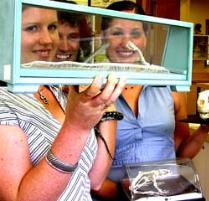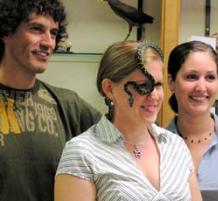Researchers share interest in snakes, frogs and turtles
Published on 14 January, 2005
Four CQU Rockhampton researchers are preparing to mix with other reptile and amphibian specialists at a herpetology conference in February.
They are PhD degree candidate Eridani Mulder, Masters degree candidates Sabrina Hall and John Clarke and PhD graduate Dr Andrea Phillott.
 The quartet will present their latest findings during the conference of the Australian Society of Herpetologists at Springbrook in the Gold Coast Hinterland.
The quartet will present their latest findings during the conference of the Australian Society of Herpetologists at Springbrook in the Gold Coast Hinterland.
Ms Mulder’s field trips near Darwin involve catching water pythons and dusky rats and examining the parasite communities within these hosts. The relationship between the snakes and rats in a closed predator-prey ecosystem leads to interest in whether parasite life cycles have adapted to this situation.
Ms Hall’s field trips to islands off the Capricorn Coast have been spent inspecting fly larvae infestations of marine turtle nests. She seeks clues to identify whether fly larvae are predators of turtle eggs, or whether they are scavengers who play a role in removing dead material from the nests.
Mr Clarke’s research is aimed at understanding the habitat and reproduction of the critically endangered Kroombit Tinkerfrog found at Kroombit Tops in Central Queensland. One of the aims of his research is to provide an understanding of the habitat and microhabitat requirements essential to efforts to breed the frogs in captivity.
 Dr Phillott is continuing studies of the fungal invasion of sea turtle eggs which she began as part of her PhD degree. Her previous research demonstrated sea turtle egg albumen and the mucus produced during egg-laying have anti-microbial properties that inhibit the fungal infection of turtle eggs. Current studies aim to isolate and identify these anti-microbial compounds using molecular techniques.
Dr Phillott is continuing studies of the fungal invasion of sea turtle eggs which she began as part of her PhD degree. Her previous research demonstrated sea turtle egg albumen and the mucus produced during egg-laying have anti-microbial properties that inhibit the fungal infection of turtle eggs. Current studies aim to isolate and identify these anti-microbial compounds using molecular techniques.
Photos: Eridani Mulder (stripes), Sabrina Hall and John Clake are heading for a national herpetology conference in February with Dr Andrea Phillott (not pictured).

